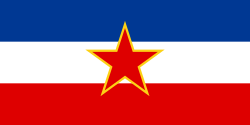 | |||
| Association | Football Association of Yugoslavia | ||
|---|---|---|---|
| FIFA code | YUG | ||
| |||
| Summer Olympic Games | |||
| Appearances | 11 (first in 1920 ) | ||
| Best result | Gold Medal, 1960 | ||
| Olympic medal record | ||
|---|---|---|
| Men's Football | ||
| 1948 London | Team | |
| 1952 Helsinki | Team | |
| 1956 Melbourne | Team | |
| 1960 Rome | Team | |
| 1984 Los Angeles | Team | |


The Yugoslavia Olympic football team was the men's national football team of Yugoslavia from 1918 to 1992 in the Socialist Federal Republic of Yugoslavia.
Contents
After the state's dissolution in 1992, the following teams were formed:
- Bosnia and Herzegovina national under-23 football team
- Croatia national under-23 football team
- Macedonia national under-23 football team
- Slovenia national under-23 football team
- FR Yugoslavia national under-23 football team (succeeded by Serbia national under-23 football team and Montenegro national under-23 football team in 2006)